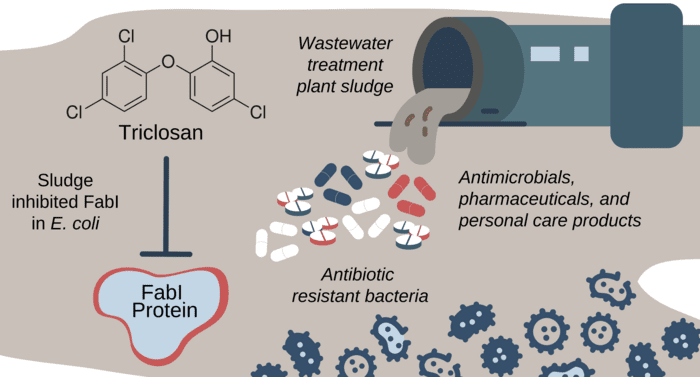A common household chemical that’s found in many products by your bathroom sink may be a major driving force of superbugs that are not killed by antibiotics, according to a new study.
The research by the University of Toronto looked at triclosan – an antibacterial and antifungal agent often included in household items like shampoos, soaps, deodorants, toothpaste, and cleaning products – and its role in the generation of antibiotic resistance in Ontario’s sewers.
Sewage treatment plants are vast swirling reservoirs of germs and antibacterial chemicals that are the ideal place for antibiotic resistance to thrive. A diverse set of antibiotics are washed down our drains along with many different strains of bacteria, which accumulate in sewage treatment plants and mingle.
The researchers headed to Ontario’s sewer and analyzed the sludge containing this unpleasant cocktail of microbes and antimicrobial chemicals They discovered that triclosan was the predominant antibacterial compound impacting E. coli and was likely to be driving antibiotic resistance within the pathogenic bacteria.
“Since there are so many different antibiotics in the sewage sludge, we were surprised to find that the majority of antibacterial activity of the sludge could be directly linked to triclosan alone,” Holly Barrett, lead study author and a PhD candidate at the University of Toronto’s Department of Chemistry, said in a statement.

Chemicals such as triclosan enter sewage treatment plants after being rinsed down our drains. There, they can interact with bacteria and cause the development of antibiotic resistance. Image credit: Environ. Sci. Technol. 2022
When we think of antibiotic resistance, we often imagine MRSA superbugs in hospitals and people being overprescribed antibiotics. While these are genuine risks, relatively few people are aware of the problem posed by household chemicals entering the sewer pipes beneath our feet.
Triclosan has been banned for certain uses in some jurisdictions. For instance, the FDA has tried to crack down on the use of the chemical in over-the-counter consumer antiseptic products in the US. However, the chemical is evidently still findings its way into sewers in Canada and the team behind this latest research say their findings show that more needs to be done to regulate this chemical in other parts of the world.
“I think our results demonstrate that there is an urgent need for regulatory agencies in Canada to re-evaluate the use of triclosan,” explained Barrett.
“It’s still used in thousands of different household and cosmetic products in Canada, as well as in health-care settings. While there are a few regulations in place to restrict the maximum amount of triclosan allowed in consumer products, even very low levels of this chemical may cause antibiotic-resistant bacteria to form over time. More action needs to be taken,” she added.
Antibiotic resistance is considered to be one of the biggest threats to global health today. Across the world, a growing number of infections that were once easy to treat – such as pneumonia, tuberculosis, gonorrhea, and salmonellosis – are becoming harder to treat as the antibiotics used are becoming less effective.
Antibiotic-resistant superbugs have recently become one of the leading causes of death worldwide and there’s little sign of this trend stopping.
The study was published in the journal Environmental Science & Technology.
Source Link: A Common Household Chemical May Be Creating Superbugs In Our Sewers